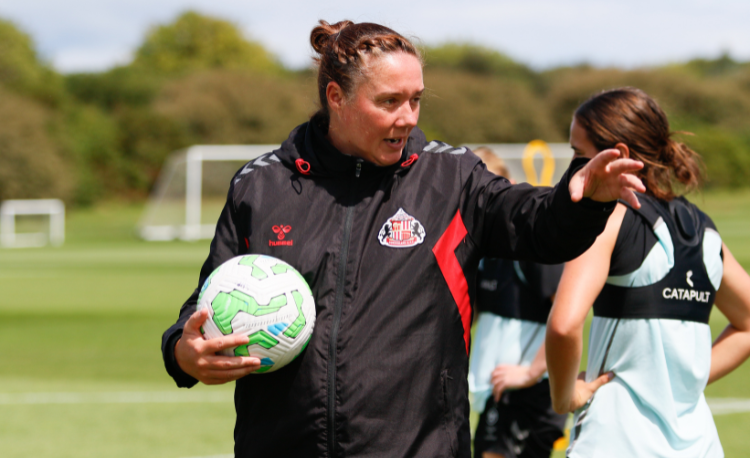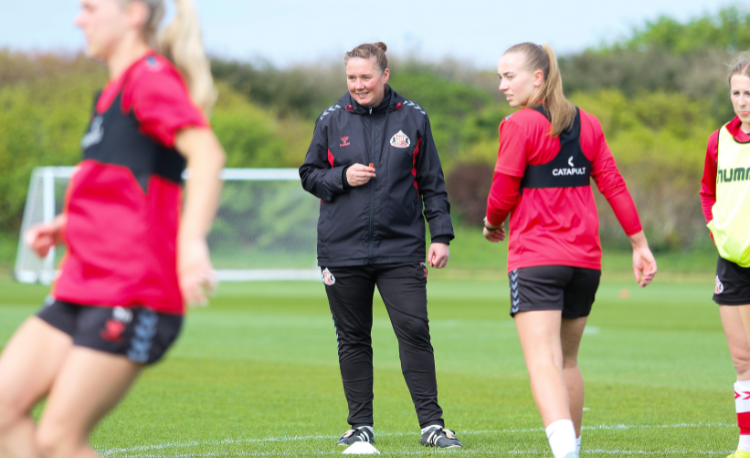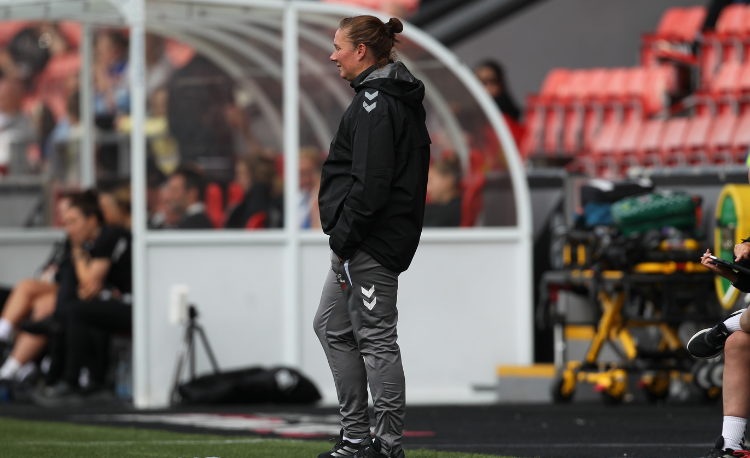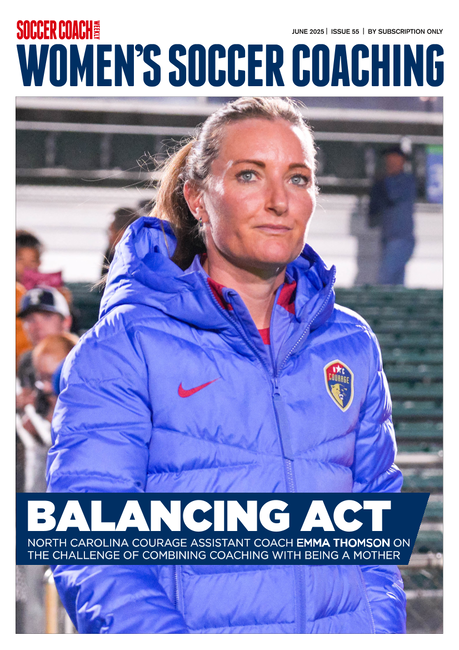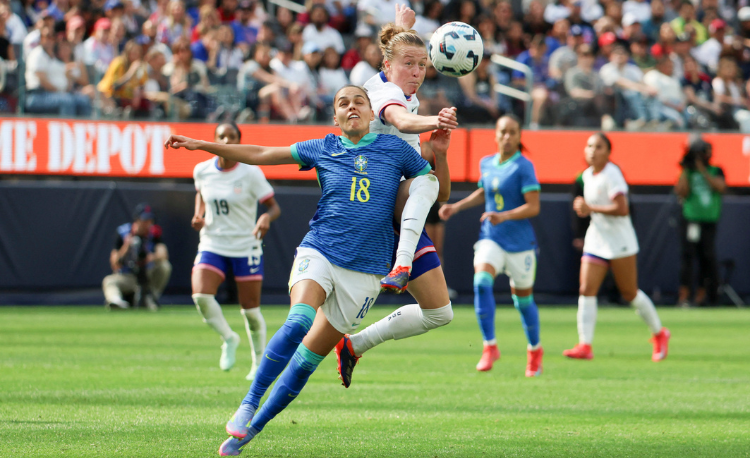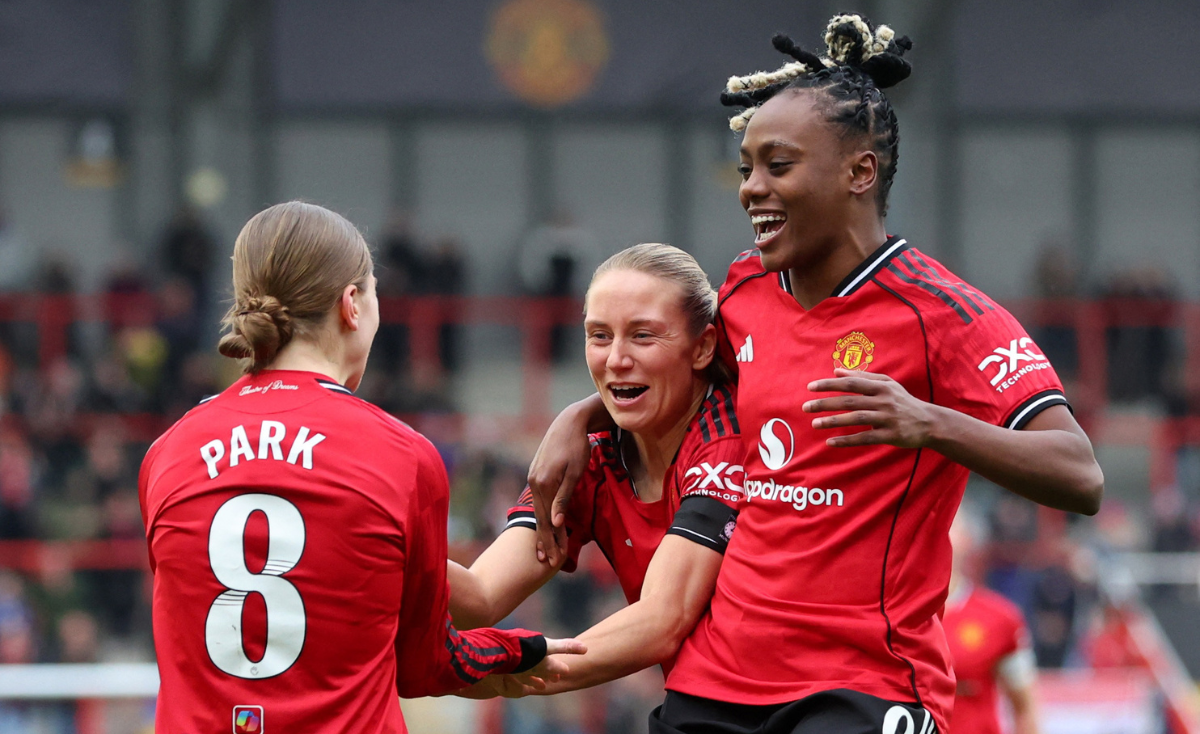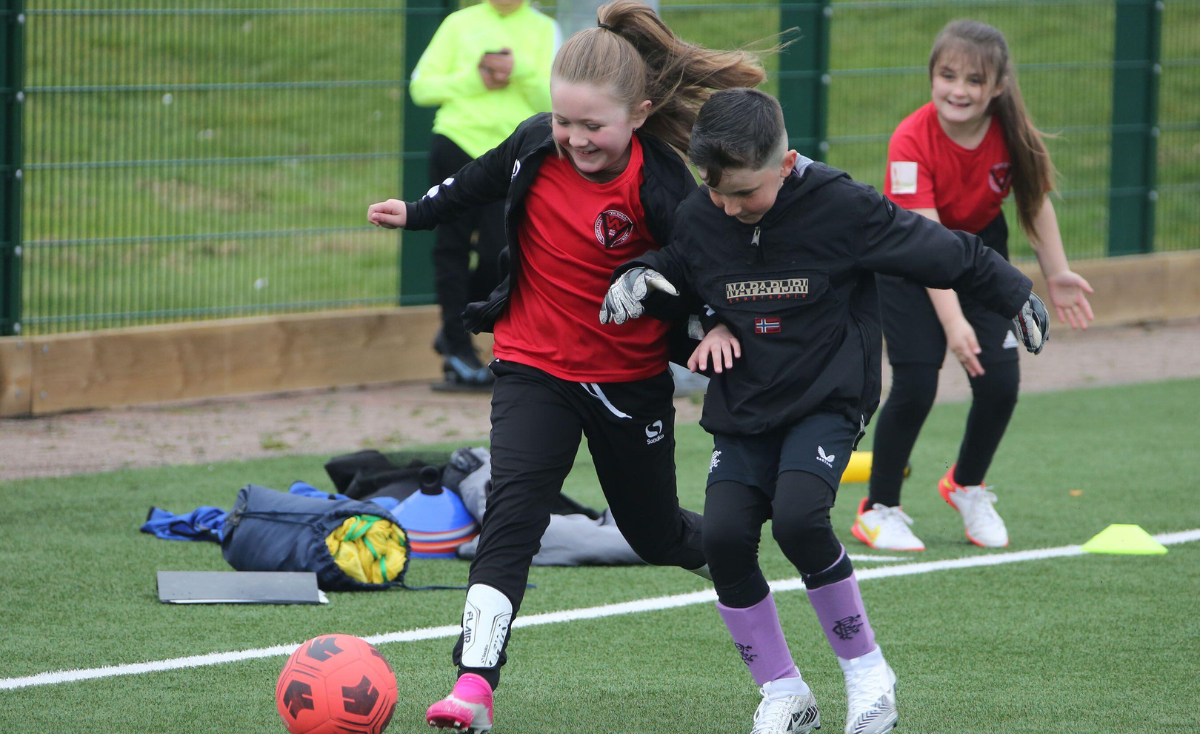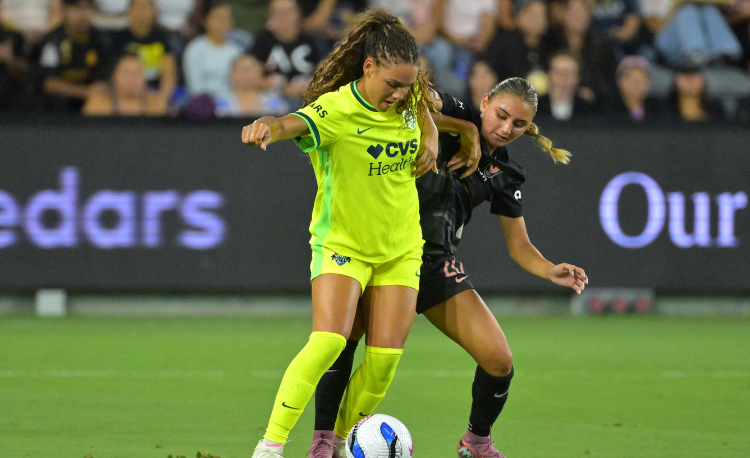You are viewing
1 of your 3 free articles
Melanie Reay: Achieving the UEFA Pro Licence
In June 2025, Sunderland Women head coach Melanie Reay was awarded the UEFA Pro Licence, eight years after achieving the A Licence. She tells Carrie Dunn about her experience of taking the qualification
“I’m looking forward to seeing the players, to be fair. It probably sounds strange saying that, but when you haven’t seen someone for two months when you’re used to seeing them every day…I’ll be intrigued to see what kind of condition they come back in and hopefully they’re hungry for success.”
Sunderland head coach Melanie Reay has had a busy summer. While her players were on their break, keeping up their fitness and logging their runs courtesy of apps, she was booking in their pre-season friendlies and working on recruitment. Even when she took a few days off, she was still on the phone to her assistant every day, and catching up with her squad on Zoom to make sure they are ready to go.
The start of a new season means a fresh page turns over, and another squad of footballers have a chance to write their names in club and league history.
“It’s always a good chance to reset, and then start with a clean slate and embed values in straight away, especially to the new players as well, and come up with some targets,” says Mel. “The vision and the principles will always remain the same, but every season we go into, it’s exciting!”
Completing the UEFA Pro Licence
Not only was she working on her usual club duties during the close season, but Mel was awarded her UEFA Pro Licence in June 2025, joining the rest of the graduating cohort for a celebration at St George’s Park.
“It’s something that I’ve wanted to do for a while, to be honest. I just never felt the time was right.
“It was a brilliant course, brilliant cohort of coaches on it, and delighted to have passed. It’s pivotal. It’s the highest qualification you can get in the game, so it was a proud moment.”
She says she is not a person who takes a qualification simply for the sake of it; having achieved her A Licence in 2017, she wanted to learn from that and gain more experience before applying for the Pro Licence. Plus, of course, there’s the time commitment, and necessity of work/life balance.
“Being a mum, being a wife: you’ve got to be in the right space and the right frame of mind to throw yourself into a course like that. I was glad I waited because the cohort that was on it were top notch, and I think you really learn a lot from the people who you’re on the course with. I think that’s the gold dust part of the course: people are willing to share and it was invaluable.”
Even getting accepted on to a UEFA Pro course is a challenge.
“First of all, you have to attend an assessment centre. It was very military. You didn’t know anything about it. You just had to turn up at St George’s Park. You were directed into a room.
“And it was done on purpose. There was no conversation. They didn’t want to get to connect with you or anything like that. They’ve brought people in to interview you. We had loads of tasks that we had to do. It was a bit like SAS, really!”
Tasks included producing pre-season plans for a team on whom they were briefed – not one with whom they were familiar. It’s no wonder that some candidates didn’t get past that hurdle. Mel got a phone call within 48 hours to say she had passed that section and had been accepted on to the course.
The Pro Licence course itself consists of seven modules, with the group meeting every couple of months around their full-time jobs. The learning isn’t simply through lectures and essays. They had hands-on practice at handling tough press conferences with genuine journalists lobbing questions at them – and when the cohort were working on leadership and decision-making, they stepped on to stage alongside the cast of mega-musical Les Miserables, singing and acting.
“I’m a secret singer!” reveals Mel. “I’m probably tone deaf, but I love a karaoke, so I was all up for stuff like that, but as you can imagine, it’s not everyone’s cup of tea.”
There were also field trips and guest talks.
“We visited high performing environments. I went to a school in London, learning about what’s special about their school and how they run, how they run the school, how they actively know who the new head teacher is going to be when one leaves - succession planning. We had a prison officer come in, a governor, a heart surgeon - how does a heart surgeon perform under pressure? Totally different being a football manager, but very similar in terms of having clear communication, running a team.”
The support each coach gets from their colleagues on the course is, Mel says, a vital part of its value. The majority of learners were from the men’s game, but she was joined by former Brighton and Hove Albion head coach Melissa Phillips and Charlton Athletic’s Karen Hills as well as Manchester United’s Mark Skinner. Mel also worked closely with her FA-assigned tutor, Joe Joyce, the former Newcastle United academy manager.
“After each module, I would meet up with Joe. We’d go for a walk and talk around the area, and I would just tell him what I’d learned and he would be intrigued and ask good questions and ask how I was going to put things into practice into the club and how I was really going to benefit from what I’d learned. That was really beneficial, I think, because sometimes you can come away and then you’re straight back into your job and then you maybe forget what you’ve learned.”
Mel says that the unique selling point of the UEFA Pro Licence is that it’s less about the detail of football tactics and more about leadership.
“The A Licence is definitely about you coaching and being able to deliver on the grass,” she says. “The Pro Licence is very much about leadership and how you manage people, how you lead people, whether that’s staff or players. I’ve actually done a course previously with the FA, the coaching excellence initiative with Audrey Cooper, and there were some real similarities on those two courses which I think put us in good stead for the Pro Licence.”
Communication is also key, or as Mel puts it: “managing [players] off the pitch as well, and managing them in and around the building and having informal conversations and getting to know them as people.”
Formal training to support coaches with these soft skills might be relatively limited, but as Mel points out: “There’s different ways you can kind of gain that kind of information: it’s not rocket science. It’s a lot about listening and the way you do communicate to people.”
Mel’s coaching path – Gateshead College and Sunderland
Mel always wanted to be a football coach. As a teenager, she was considering going to the USA on a soccer scholarship, having developed her playing skills at the women’s football academy set up by former England manager Ted Copeland and then stepping up to Sunderland. Instead, she stayed in the north-east of England, and started coaching at Gateshead College.
“That’s where I learnt my trade as a coach. That’s where I went through the qualifications – UEFA B, A Licence - and coached some really good players along the way. It was a hotbed. Because I played for Sunderland, it was like an informal pathway really for the young players to come through: the likes of Jill Scott, Carly Telford, Demi Stokes, Rachel Furness, Steph Bannon. Anyone who was anyone came to the college and then played for Sunderland in the senior team! So I really enjoyed it. I still keep in touch with the with the staff there now, and that’s where my passion for developing young players probably came from.”
She became Sunderland manager in 2017, and says that one of the things she tries to do with those young players is ensure they know their history – both on a national level and at their famous old club. Understanding how fast and far the women’s game in England has travelled is crucial as far as she is concerned; Mel points out that simply getting a full-time contract rather than working a day job before heading to training is a complete contrast to her own experience.
“They’re very fortunate and I don’t wish I was younger because I played my part and I’m doing what I’m doing. But in 20 years’ time, what’s the game going to look like for the new generation that’s not even been born yet? It’s crazy where it’s gone, but the tradition and the values still remain the same at Sunderland.”
She adds: “I still try and keep the history of the football club present because I think that’s really important.
“I never ever, ever got paid for playing football. I played at the highest level, won trophies, and I paid to play, and bag-packed in the local supermarket so we could get a bus to Arsenal.
“Those stories are so important to ensure that the players who are then given the opportunity know where the club was, and the players who have left the shirt in a better place, have been able to give them opportunities to the to the youth coming through now.
“As long as I’m there, I’ll still try and tell the stories to the to the younger ones and even the new players who come in from outside the area because it’s been a hell of a journey.”
The season ahead
Sunderland will be competing in the newly-renamed Barclays Women’s Super League 2 in 2025-26 – along with fierce rivals Newcastle United and near neighbours Durham. Men’s football has always been very important to folk in the north-east, and Mel is pleased to see that the women’s game is increasingly popular and thriving.
“When I played, there was only ever Sunderland in the north-east who were who were in the top flight, and every other game was away to London, it was very much southern-based,” says Mel. “There’s a bit of a nice geographical split now in the league.
“I’m excited that it’s grown in terms of the size of the league because 22 games isn’t enough. If you lose a few early doors, you’re pretty much out the running, which takes away the excitement.
“It’ll be interesting this season in terms of what happens with the two automatic promotion spots, which is really good, and the play-off between the [12th-placed WSL] team and the [third-placed WSL2] team. The jeopardy’s got to be there. That’s what that’s what makes the game exciting with the tradition of the English league.”
Newsletter Sign Up
Newsletter Sign Up
Discover the simple way to become a more effective, more successful soccer coach
In a recent survey 89% of subscribers said Women's Soccer Coaching makes them more confident, 91% said Women's Soccer Coaching makes them a more effective coach and 93% said Women's Soccer Coaching makes them more inspired.
*includes 3 coaching manuals
Get Inspired
All the latest techniques and approaches
Women's Soccer Coaching offers proven and easy to use soccer drills, coaching sessions, practice plans, small-sided games, warm-ups, training tips and advice.
We've been at the cutting edge of soccer coaching since we launched Soccer Coach Weekly in 2007, creating resources for the grassroots youth coach, following best practice from around the world and insights from the professional game.
